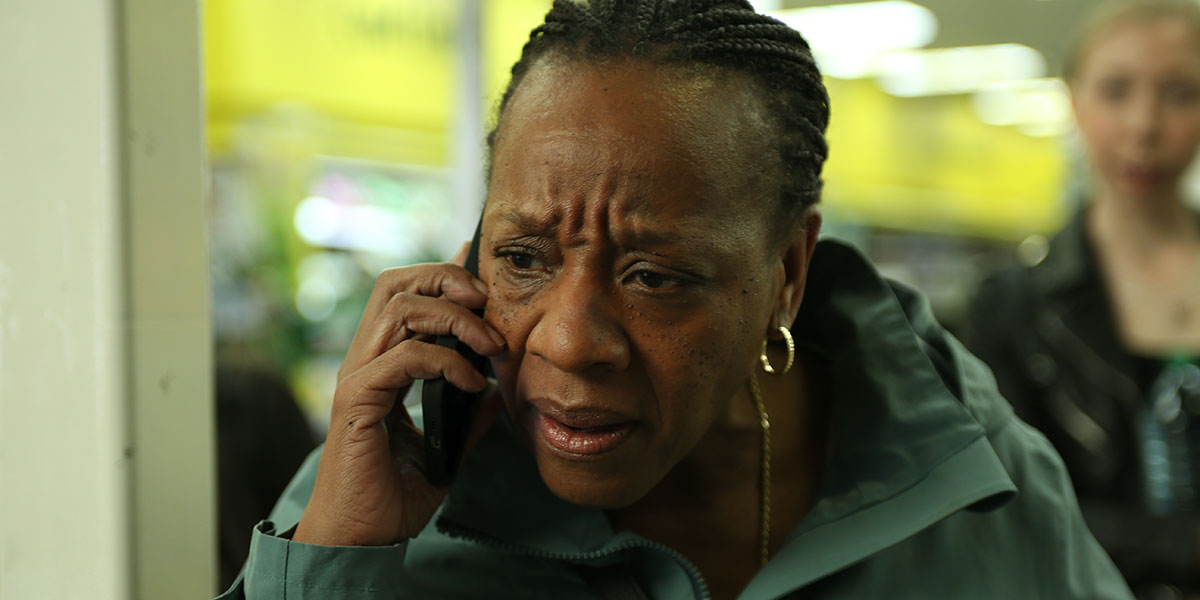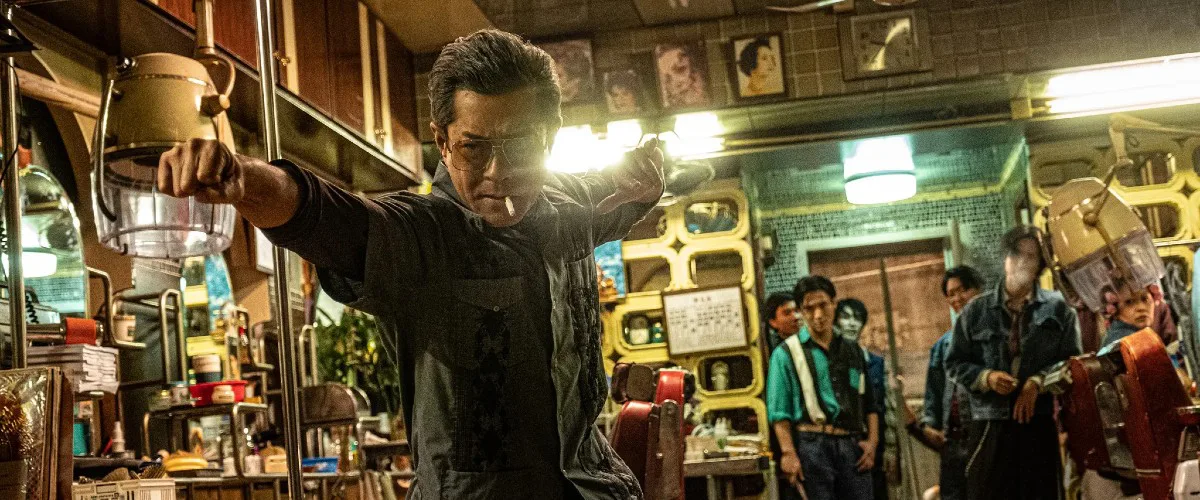

The Belfast schoolchildren stand in their classroom, singing “Óró Sé do bheatha abhaile,” a traditional Irish song, in the Irish language required in their school. They drone the lyrics, looking bored out of their minds. Two boys in the back, sharing earbuds, are pretending to sing along but are actually listening to another kind of music, hip hop, by an exciting new local trio called Kneecap. Kneecap rap in the Irish language. It isn’t something you hear every day. This brings up one of the many interesting points made in Rich Peppiatt’s “Kneecap,” a funny, exhilarating film about the real-life Kneecap, where the members of the group – Liam Óg (stage name Mo Chara), Naoise Ó Cairealláin (stage name Móglaí Bap) and JJ Ó Dochartaigh (stage name DJ Próvaí) – play themselves.
The Irish language was nearly stomped out of existence. Speaking in Irish is seen by many as a political act. Kneecap was formed in 2018 amidst the controversial “discourse” surrounding Sinn Féin’s proposed Irish Language Act. The Irish Language Act would legally place Irish on the same level as English, which would include garda interrogation rooms and the courts. The “Óró Sé do bheatha abhaile” scene is a snarky representation of the various strands of dialogue at play around the Irish language. A language needs to grow in order to live; it needs to be present in the Now. A traditional song from a century ago has no relevance to the 21st-century kids singing it. But a trio of angry men screaming
C.E.A.R.T.A
Is cuma liomsa foc faoi aon gharda,
Duidín lásta, tá mise ró-ghasta,
Ní fheicfidh tú mise i mo sheasamh ró-fhada
is another thing entirely.
(Translation:
R.I.G.H.T.
I don’t give a f*ck about any Garda A lit joint,
I’m too fast,
You won’t see me standing too long.)
Now that’s a living language.
Unsurprisingly, Kneecap’s music caused a wave of controversy, mostly because of their gleeful detailing of their drug use, but also because of exposing their asses with “BRITS” on one butt cheek and “OUT” on the other. A newscaster tut-tuts: “This is the true face of the Irish language.” The Irish language advocates did not consider Kneecap good ambassadors for the language and, in fact, were hurting the cause. Meanwhile, Kneecap was playing sold-out shows, where hundreds of kids were screaming lyrics in Irish. Shouldn’t the Irish language people welcome this development? Of course, they don’t!
One film can’t explain all of the complexities around the Irish language and its history, but “Kneecap” does a remarkable job laying it all out (while also making it fun). The film’s style is frenetic and propulsive, profane and provocative, peppered with jokey asides, stylistic flourishes (slow-mo, animation), and pulled along by a snarky voiceover (reminiscent of Ewan McGregor’s voiceover in “Trainspotting”). The film is unabashed in its portrayal of drug use and the realities of life in West Belfast among the generation nicknamed “the Ceasefire Babies.” (Journalist Lyra McKee wrote a remarkable article for The Atlantic in 2016 called Suicide Among the Ceasefire Babies, saying, “We were the Good Friday Agreement generation, spared from the horrors of war. But still, the aftereffects of those horrors seemed to follow us.” Tragically, infuriatingly, McKee was right. In 2019, she was murdered at a protest in Derry.)
Naoise’s father, Arlo (Michael Fassbender), was in a paramilitary group and has been on the run for 10 years after faking his death. (He tells his son, “Every day I am not captured is a psychological victory against the occupiers.”) His absence from Naoise’s life has been catastrophic for both Naoise and his depressed mother (the excellent Simone Kirby). The film opens with Liam refusing to speak English in a police interrogation. A translator is called in, JJ Ó Dochartaigh, who teaches music at an Irish language school and is married to an Irish language activist. JJ learns that Liam and Naoise have written a song called “C.E.A.R.T.A.” He helps them record it in the makeshift studio in his garage.
Their gigs at first are teeny. They play in pubs, where old men drink Guinness at the bar, wondering what the hell is going on. Word spreads. Kids start showing up. JJ joins the trio, adopting the name DJ Próvaí. He wears a balaclava onstage (in the colors of the Irish Republic’s flag, of course) because he’d probably lose his job and his wife. They call themselves Kneecap after the “kneecapping” punishment endured by drug dealers from Irish paramilitary groups. (There’s one such group after Kneecap. They call themselves “Radical Republicans Against Drugs,” and they are scary guys. They burn down JJ’s garage studio.)
Hip hop’s origin story comes out of the ad hoc, the DIY, “outsiders” screaming their voices at a mainstream that ignores them. Hip-hop is inherently political; it is legitimate protest music. The controversies around N.W.A.’s lyrics are a case in point, but we don’t need to go back in time to provide context. (The ongoing persecution of Iranian rapper Toomaj Salehi is the worst example of its kind and probably the most important thing going on in hip-hop right now.) Governments fear freedom of speech. So, too, do advocate groups who want to control the narrative. Kneecap blasts through all of that.
Liam hooks up regularly with a girl (Jessica Reynolds) on the other side of the tracks (not Republican, in other words), and their sex is wild and passionate, filled with balaclava-wearing role-play and political disagreements shouted in the heat of passion. (Is it “North of Ireland” or “Northern Ireland”? Hot!) In one of their arguments, Liam tosses in a furious reference to Ireland’s 1916 Proclamation. This doesn’t feel cheeky or intellectualized. It feels local and authentic. Some viewers might need footnotes. The film barrels on without you.
Having the Kneecap members play themselves was a bold choice, and it pays off. They’re engaging and unself-conscious, and professional actors like Fassbender and Kirby bring out the best in everyone. “Kneecap” is “about” a lot of things, and its pace makes it impossible to resist getting swept up in it. I’ve been following Kneecap for a while but didn’t know much about their backstory. “Kneecap” isn’t an underdog rags-to-riches story. It’s about the right of people to say what they want to say, to criticize the power structures ruling their lives, and to create a community of opposition. And, yes, to put “BRITS OUT” on their butt cheeks. That’s free speech, too.



